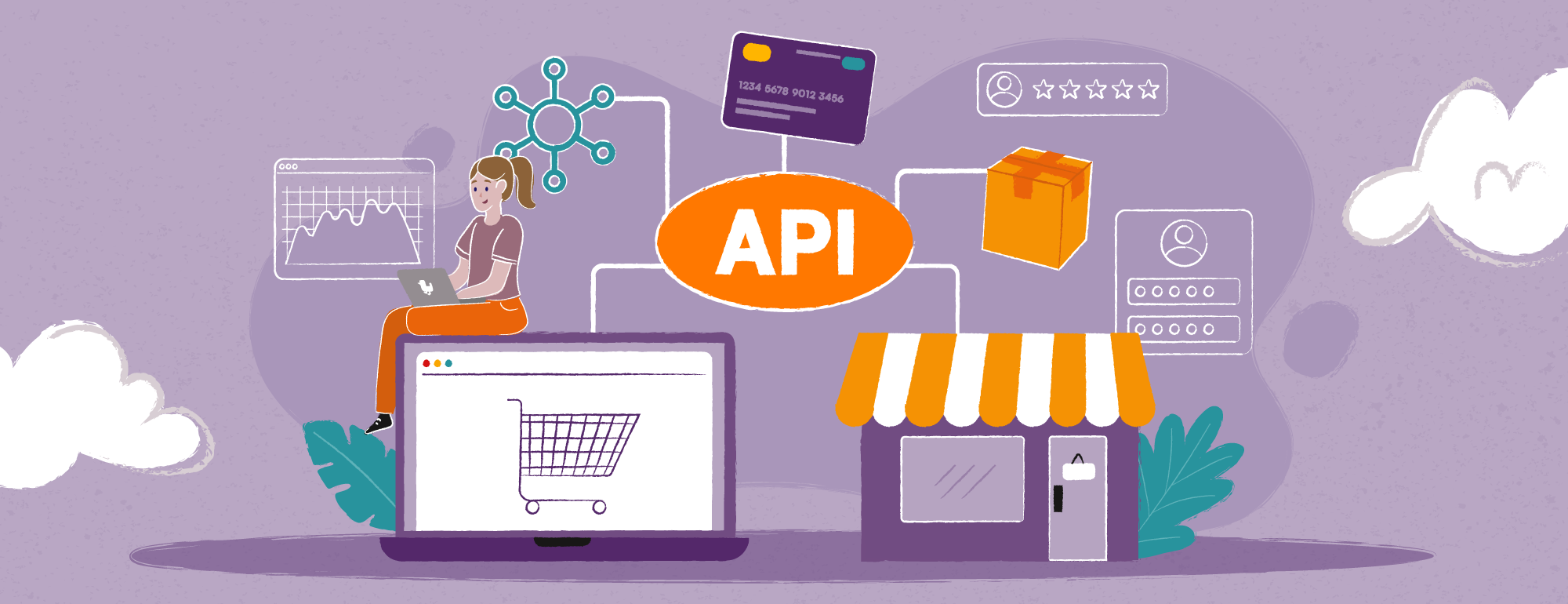The Ultimate Guide to Ecommerce API: Power Up Your Online Store
In today’s competitive online retail landscape, standing out requires innovation and efficiency. Enter Ecommerce APIs, the secret weapon for businesses looking to unlock the full potential of their online stores. What precisely are they, and what advantages can they bring to your business? This comprehensive guide dives deep into the world of Ecommerce API, equipping you with the knowledge to leverage their power and propel your online store to new heights.
What is an Ecommerce API?
An Ecommerce API (Application Programming Interface) acts as a bridge between your online store and other applications. It allows them to “talk” to each other, seamlessly sharing data and functionalities. Imagine it as a digital waiter, taking orders (requests) from your website or app and delivering them to the appropriate backend systems (kitchen) for processing, then bringing back the results (dishes) for display.
Why Use Ecommerce APIs?
Ecommerce APIs offer a treasure trove of benefits for businesses:
- Enhanced Functionality: Extend your store’s capabilities by integrating with external tools, like payment processors, shipping providers, or marketing platforms. For example, integrate with a social media platform’s API to enable social logins for a more streamlined customer experience.
- Seamless Integration: Eliminate data silos and manual processes by connecting your store with other systems, ensuring smooth operation. Imagine no longer needing to manually update product information across your website and accounting software – the API takes care of it automatically.
- Improved Scalability and Efficiency: APIs allow you to adapt and grow your store as your business expands. Need to handle increased traffic during peak seasons? Integrate with a cloud-based fulfillment API to ensure orders are processed efficiently without hiccups.
- Personalized Customer Experiences: Leverage APIs to personalize product recommendations, offer targeted promotions, and provide a more engaging shopping experience. Recommend complementary products based on a customer’s browsing history using a product recommendation API, or tailor email marketing campaigns with customer data retrieved through a marketing automation API.

Types of Ecommerce APIs
Ecommerce APIs come in a variety of flavors, each designed to address specific aspects of your online store’s functionality. Here’s an in-depth examination of several prevalent varieties:
Product Management APIs:
Act as your digital product catalog manager. You can create, update, and delete product listings, manage inventory levels, and synchronize pricing across multiple sales channels – all through API calls. Imagine updating product descriptions on your website, mobile app, and online marketplace listings simultaneously – a breeze with a product management API.
Order Management APIs:
The workhorses of order processing. These APIs handle everything from order creation and payment capture to fulfillment updates and communication with customers. Imagine receiving real-time shipment tracking information from a carrier’s API and automatically updating your customers on their order status – a seamless experience powered by order management APIs.
Customer Management APIs:
Grant access to your customer data goldmine. You can retrieve and manage customer information like account details, purchase history, and preferences. Leverage customer management APIs to create targeted marketing campaigns, offer personalized product recommendations, or implement loyalty programs that reward repeat customers.
Payment Processing APIs:
Secure gateways for handling customer transactions. Integrate with popular payment processors like Stripe or PayPal using their APIs to enable seamless and secure payment processing. Consider subscription management APIs if you offer recurring billing options – they simplify the process of setting up and managing subscriptions for your customers.
Shipping & Fulfillment APIs:
Streamline your delivery game. Connect with carriers and fulfillment providers through their APIs to automate shipping processes, calculate real-time shipping rates at checkout, and generate tracking information – all with minimal manual effort. Imagine offering your customers a variety of shipping options with transparent pricing at checkout, thanks to the power of shipping & fulfillment APIs.
Marketing & Analytics APIs:
Fuel your marketing efforts and gain valuable customer insights. Integrate with marketing automation tools or analytics platforms using their APIs to launch targeted campaigns, personalize customer experiences, and collect data for insightful business decisions. Imagine sending personalized abandoned cart reminders or win-back campaigns based on customer behavior – a powerful marketing tactic made possible by marketing & analytics APIs.
By understanding these different types of Ecommerce APIs, you can identify the ones that best suit your needs and unlock a world of possibilities for your online store. Remember, a well-integrated API strategy can transform your operations, enhance customer experience, and propel your business forward.
Popular Ecommerce API Platforms
Choosing the right API platform hinges on your specific needs. Here’s a breakdown of some popular options, along with their strengths:
- Shopify API: King of User-Friendliness: Renowned for its intuitive interface and vast app marketplace, Shopify is a perfect springboard for businesses dipping their toes into the world of APIs. Its extensive library of pre-built integrations allows you to connect your store with a multitude of tools without extensive coding knowledge.
- BigCommerce API: Scalability Champion: BigCommerce caters to growing businesses with its robust features and focus on developer experience. Their well-documented API offers a powerful foundation for building custom integrations and scaling your operations seamlessly.
- WooCommerce API: ️ Customization King: Ideal for businesses already comfortable with WordPress, WooCommerce offers a high level of control over API integrations. This flexibility allows for deep customization to perfectly align with your unique needs.
- Magento API: Enterprise Powerhouse: A powerful and versatile platform catering to complex business needs, Magento boasts a vast array of functionalities exposed through its API. This makes it a popular choice for large-scale online stores requiring intricate integrations.
- Stripe API: Security & Simplicity Champion: A leading payment processing API, Stripe is renowned for its robust security measures and user-friendly interface. It integrates seamlessly with various platforms, making it a popular choice for businesses of all sizes looking for a secure and hassle-free payment solution.
Choosing the Right Ecommerce API
Selecting the perfect API requires careful consideration:
- Functionality Requirements: Identify the specific functionalities you need the API to provide. Do you need an API for managing product subscriptions, or are you looking for one to integrate with a specific marketing automation platform?
- Development Resources: Assess your in-house development capabilities. If your team lacks experience with API integration, consider partnering with API integration specialists.
- Budget Constraints: API pricing models vary. Some platforms charge a fixed monthly fee, while others have usage-based pricing. Factor in costs when making your decision.
- Scalability Needs: Choose an API that can grow alongside your business without limitations. Consider the API’s ability to handle increasing traffic and data volume as your business expands.
- Security Considerations: Ensure the API adheres to robust security protocols to protect sensitive customer data. Look for features like encryption and two-factor authentication.
Getting Started with Ecommerce APIs
Ready to unlock the power of APIs? Here’s a roadmap to get you started:
- Understanding API Documentation: Every API comes with comprehensive documentation that explains its functionalities, available calls, and usage guidelines. Spend time familiarizing yourself with the documentation before diving into integration.
- Common API Calls and Methods: Most APIs utilize standard methods like GET (retrieve data), POST (create data), PUT (update data), and DELETE (remove data). Understanding these methods is crucial for effective API interaction.
- Authentication and Authorization: APIs employ security measures to control access. You’ll typically obtain API keys or credentials to authenticate your application and authorize specific actions.
- Using Ecommerce APIs in Your Project: The integration process involves writing code that interacts with the API using its defined methods and data structures. Some platforms offer pre-built libraries or code snippets to simplify integration.
Advanced Ecommerce API Techniques
- Once you’ve mastered the basics, explore these advanced techniques to elevate your online store:
- Real-time Inventory Management: Integrate with an inventory management API to maintain accurate stock levels across all sales channels. This eliminates overselling and ensures customer satisfaction.
- Personalized Product Recommendations: Leverage product recommendation APIs to suggest relevant items based on a customer’s browsing history and past purchases. This personal touch can significantly boost sales.
- Streamlined Order Fulfillment: Integrate with a fulfillment API to automate order processing, warehousing, and shipping. This reduces fulfillment times and improves customer experience.
- Integrating with Marketplaces: Expand your reach by connecting your store with popular marketplaces like Amazon or eBay. Utilize marketplace APIs to efficiently list and manage products on these platforms.
- Leveraging Analytics Data: Extract valuable customer insights through analytics APIs. Use this data to personalize marketing campaigns, optimize product offerings, and make data-driven business decisions.
Best Practices for Ecommerce API Development
For seamless and secure API integration, follow these best practices:
- Security Considerations: Prioritize robust security measures. Regularly update your API credentials and enforce access controls to prevent unauthorized activity.
- Error Handling and Troubleshooting: Implement robust error handling mechanisms to catch and address any issues that may arise during API interactions. This ensures smooth operation and minimizes downtime.
- API Versioning and Updates: As APIs evolve, they may undergo version changes. Stay updated on version changes and adapt your code accordingly to maintain compatibility.
- Performance Optimization: Optimize your API calls for efficiency. This minimizes response times and ensures a smooth user experience on your online store.
Conclusion
Ecommerce APIs are a game-changer for online businesses. By leveraging their power, you can unlock a world of possibilities, from enhanced functionality to streamlined operations and personalized customer experiences. As the future of ecommerce unfolds, APIs will play a central role in empowering businesses to thrive in the ever-evolving digital landscape.
Ready to harness the full potential of Ecommerce APIs and propel your online business forward? OnextDigital is your one-stop shop for all your ecommerce needs. We offer a range of services designed to help you build a thriving online store, including Web Development Service, UX/UI Design Service. Our design team will create a user-friendly and visually appealing interface that optimizes the customer journey and maximizes conversions, and CRM & Auto Marketing Implementation Service. Contact us today and let’s discuss how we can help you unlock the power of Ecommerce APIs and transform your online store into a success story.








